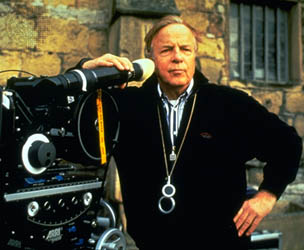It’s a little startling to realize that there is someone alive today who was legally not allowed to be given either of his parents’ names because they were both married to other people when he was born. I live in a state that literally does not care what last name you give your kids on their birth certificates; my older daughter has never had my last name, not even before the adoption went through, because I knew before she was born who she was going to. But Franco Zeffirelli was the son of Alaide Garosi and Ottorino Corsi, and the law held that he could not be either Garosi or Corsi. Garosi intended to give her son the last name Zeffiretti, or “little breezes,” as a Mozart reference, but it was spelled wrong on his birth certificate.
It’s also worth noting that three of his best-known films are Shakespearean adaptations. He directed probably the definitive film version of Taming of the Shrew, for all I prefer 10 Things I Hate About You—and actually Kiss Me, Kate! as well, not being much of a fan of Burton-Taylor as a screen pair. (They were, in my opinion, weirdly devoid of chemistry onscreen despite, or maybe because of, their tempestuous relationship off it.) His 1968 Romeo and Juliet is notable for, among other things, casting actual teenagers in the lead roles. And I’m still a devotee of his Hamlet despite the incredibly troubled personality of its star, which may in some ways feed into it.
I have for years wanted to get a bunch of people together to get dressed up in formal attire to go see The Metropolitan Opera HD Live at my local theatre, one day when they’re broadcasting live opera into theatres around the country. Twice, that could have been Zeffirelli productions. In addition to his films, he is well known for directing opera. If you know enough about either artform, you can definitely see the crossover. It’s definitely true that no one should have even tried to direct Richard Burton and Elizabeth Taylor in something without a firm grasp of spectacle, especially not something as heated as Shrew. And his Romeo and Juliet uses not only real teenagers but real locations in Verona to create a distinct vision.
There’s something endearing to me about the fact that Zeffirelli considers himself a homosexual because he doesn’t like the word gay—he considers it less elegant. There are Christians who don’t like him because they think some of his productions are blasphemous, and apparently he’s stood with the Catholic Church on issues to do with gay rights. It turns out that someone who’s old enough to have been a partisan during World War II may not be completely modern in his outlook, shockingly enough.
I did not choose him for today because of his Jesus of Nazareth or Brother Sun, Sister Moon, because I’m pretty sure I haven’t seen either of them. So I can’t speak to how he deals with religious themes in his work. I’ve read that there are people who are not thrilled with it, but I’m definitely going to have to take others’ words for it. Apparently, though, there are quite a lot of people for whom the former is traditional viewing today, and let’s hope they’ll take a minute to consider the director, still alive at 94.


